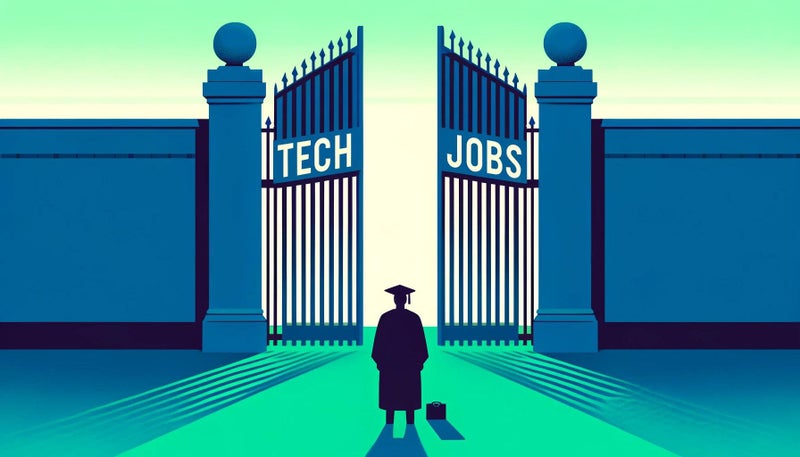Contents
- The Outliers: You’re Probably Not One of Them
- The Irony of Degree Requirements
- The Continued Undervaluing of Experience
- Degrees as Gatekeepers Locking You Out
- Gaining The Skills to Pay the Bills
You can’t apply for that job. You don’t have the right degree. Maybe you don’t have any degree. But you have 10 years of experience. And you once built an app that was downloaded 3 million times. And you have over 40 certifications in cutting-edge tech like AI, data analytics and advanced systems engineering.
- A sane person would hire you.
- A system that worked would recognize your talent.
- An industry short on skilled labor would be so lucky to have you!
Yet here we are in 2024.
Up against a weird pseudo-system that adopts AI, yet rejects basic logic.
Why does a piece of paper hold such importance in tech?
Employers still cling to mindless, pointless and ferociously unjust degree requirements that – quite frankly – should be trapped in the Upside Down from Stranger Things, never to be seen or heard from again.
We’re told the system is changing – but it’s slow.
The movement of tectonic plates slow.
And in the meantime, thousands of talented tech people aren’t getting jobs.
- Only 1 in 700 hires in the US was skills-based last year!
- Overall, we’re looking at 97,000 hires, out of 77 million.
This is direct from the latest report by Harvard Business School and the Burning Glass Institute.
They say that while tech companies acknowledge skills-based hiring makes more sense, they’re NOT changing how they hire.

That’s incredibly problematic.
A lot of companies have declared that skills-based hiring is the solution, but 45% of them have failed to change their hiring behavior or have backslid altogether.
You’re up against a broken system lousy with inequality, bias and bad practices.
- Job postings that say ‘no degree required’ but don’t mean it.
- Hiring managers that will interview you, but not hire you.
- And those are just the small percentage of companies focused on skills over degrees!
So today I’m looking at the irony of degree requirements, why they’re still keeping the best people from the best jobs in tech, and how you can get ahead of the game using what you’ve got.
The Outliers: You’re Probably Not One of Them
‘You don’t need a college degree to get ahead in tech.’
Just look at people like Steve Jobs and Mark Zuckerberg!
We love to tell ourselves stories and be inspired by the outliers among us.
Malcolm Gladwell wrote an entire book about how these outliers weren’t only products of talent and hard work, they had unique opportunities that made their trajectories possible.
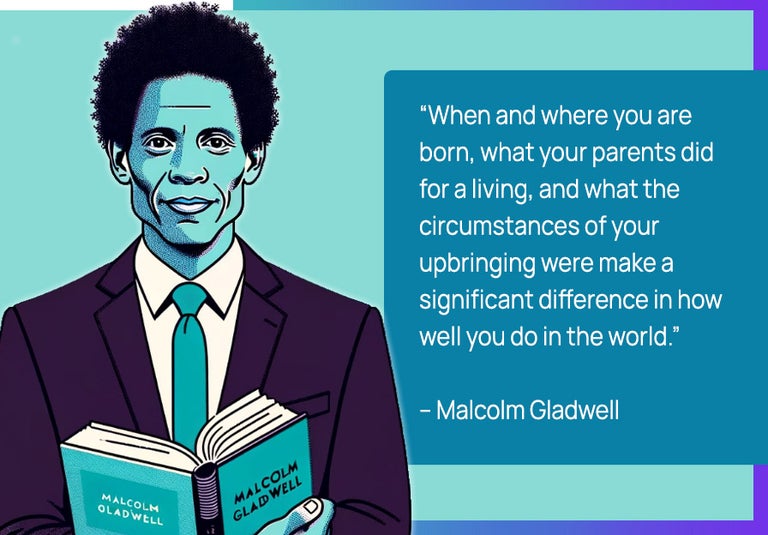
Mark Zuckerberg for example, may never have finished his degree – but there were other forces that came together that resulted in his massive success.
He had early access to programming through his dad and had his own private tutor. Mark went to Phillips Exeter Academy, which was an elite prep school with advanced computing resources on campus.
And Harvard – I mean the network of talented folks he met there made Facebook possible. Talk about right skills, right time, right place.
So yes, it’s 100% possible to not need a college degree and yet still achieve success in tech. But if you’re not starting the company yourself, the odds are stacked against you.
If you work in tech, put this line of thinking aside for now.
It doesn’t serve you to think like a start-up founder when that’s not your reality.
Let’s bring it back to what is possible. This is for talented tech workers.
The Irony of Degree Requirements
Degrees act as gatekeepers for the best jobs in tech.
They reinforce inequality and help companies ignore job performance facts.
- We already know degrees are an unreliable job performance indicator.
- Most tech is SO new it’s impossible to have a directly related degree
- AI is actively challenging the usefulness of traditional degrees
LinkedIn’s CEO said, “AI’s going to make it virtually impossible for a one-off moment of learning (like a degree) to last an entire career.”
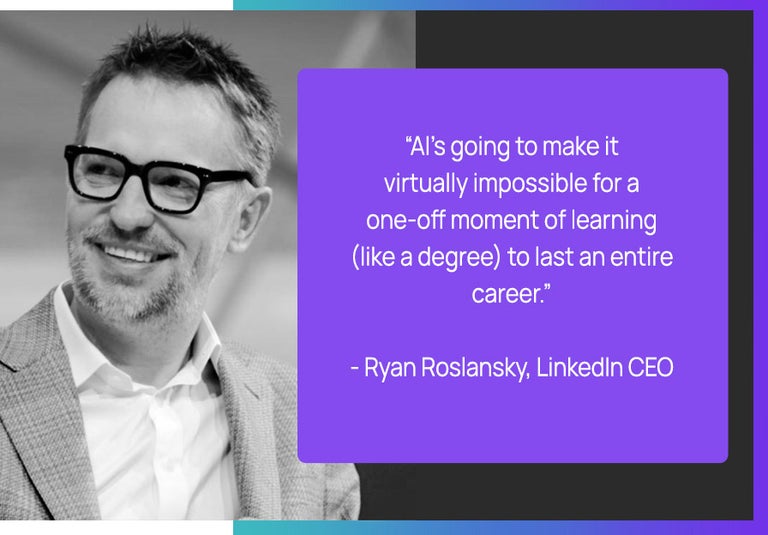
Yet everyday, on LinkedIn tech companies insist on increasingly outlandish degrees from Ivy League Universities in the US. The irony!
The rapid change is enough to confuse a lot of people in tech.
That’s when you get posts like this:
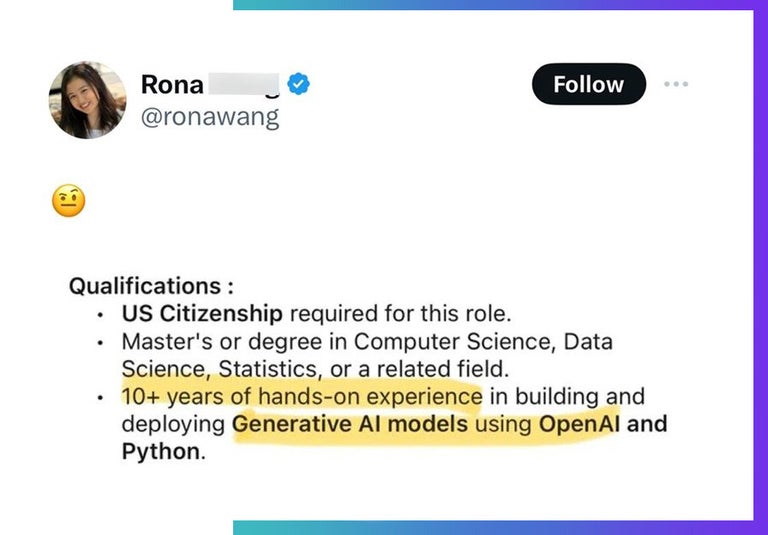
Tech is a field that requires constant learning.
The industry’s reliance on degrees is a direct contradiction of its own emphasis on innovation and adaptability. It’s a snake eating its own tail.
It makes no sense to continue to value degrees above experience.
But that’s exactly what the tech industry does.
The Continued Undervaluing of Experience
It’s fine if you don’t have a degree!
As long as you have the ‘equivalent practical experience necessary.’
That makes sense. But it’s a lie.
Last year Andrew did an episode of Out of Office that became one of our most popular episodes, ever. The Paper Ceiling Episode.
The part that still resonates is the impact this SLOW adoption of modern hiring practices is having on people who work remotely all over the world.
Remember the Opportunity@Work study? It showed that 30 years worth of experience means LESS than 4 years of study.
Watch the clip below for more:
A 25-year-old graduate always earns more than someone without a degree.
Thirty years on, and the non-degree holder still earns less than the graduate on day 1, even after adjusting for inflation.
That’s outrageous!
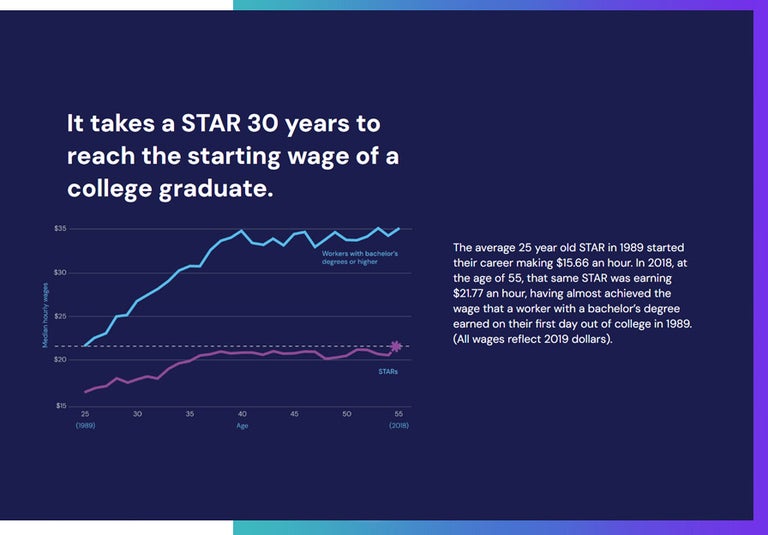
Clearly: experience means nothing if you don’t have a college degree in the US.
Look - education is fundamental to innovation, and degrees are important.
I’m not here to rag on going to college and I’m not saying your time investment was for nothing if you have degrees. I went myself, a couple of times, in person and remotely.
But experience doesn’t carry the weight it should, yet.
Not if you want to work for a US-based tech company. Overreliance on college degrees is keeping too many good people from innovating or advancing at key companies.
The old advice your dad gave you “You have to get a degree to get anywhere in life,” still applies.
This is what we work to change at Crossover.
Degrees as Gatekeepers Locking You Out
What most concerns me is how blindly hiring managers use degrees.
They’re used to keep bad hires out.
Based on assumptions that haven’t been properly challenged – in years.
- Experience is not as valuable as a degree.
- Certifications are not as valuable as a degree.
- Evidence of real-time learning is not as valuable as a degree.

Studies cited in the MITSloan Management Review have disproven these beliefs, and shown productivity rises rapidly with experience, especially in younger hires. They tend to learn faster, upskill often and that’s what makes them better performers.
In my 15-year career in global technology, I’ve never met a successful software engineer who didn’t constantly learn. Their jobs would be completely obsolete without that skill.
Some of the best engineers have English Language degrees, and taught themselves how to code.
Some didn’t bother with college at all.
It’s widely known that experience and ongoing learning are your most valuable resources as a software developer. Up-to-date certifications are evidence of that.
These assumptions are completely incorrect.
Experience, real-time learning and ongoing certifications are MUCH more important in the age of rapid change, AI and progress than a degree.
Even if they’re not seen that way yet, they are.
Skills are what truly give tech talent REAL, calculable value.
Gaining The Skills to Pay the Bills
So here we are.
- Some of us have mismatched degrees, and they’re limiting our progress.
- A few have no degree at all and can’t even show employers what they’ve got.
What are your options? How are you going to get ahead, when hiring managers refuse to even look in your general direction without the right degrees?
It boils down to shaping your skill-building process.

A skill is made up of three ingredients:
- Knowledge: Regularly update your know-how, theoretical and practical – on the latest technologies influencing your job. AI, data, code, whatever it takes. Gain a deep understanding of concepts and build a high value foundation for growth.
- Practice: Theoretical knowledge is not as valuable as knowledge-in-practice. Take what you learn and push the boundaries. Practice consistently and deliberately to hone the skills required for you to master your job.
- Experience: Experience isn’t a number assigned to how long you’ve known something. It’s how long you’ve been creating impact or results in that field. Experience, is the accumulation of results from learning and practice.
That’s not the end of skill-building… just the beginning. Once you’ve picked the right skills to master, you can cash in on them. In tech, results have legs.
You just have to know which skills to pick.
- Generative AI skill
- Job test-taking
- Automation and AI
- AI recruiting
- Coding with AI
- Video interviewing
- Networking
- Portfolio building
It seems simple, but it's not. That’s why most people don’t do it. Don’t be like the very people excluding you from top tech jobs. Don’t ignore the skills that matter!
Degrees don’t prove anything, but you can.
To every single person who is stuck because of degree inequality, because of that paper ceiling – don’t let it hold you back.
Elevate your skills to turn your experience, practice, and knowledge into true expertise – and throw that gate open wide! Join us in driving change and proving that skills - not degrees - are what really matter for tech innovation.


